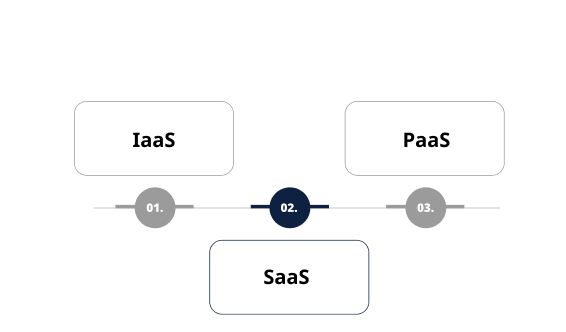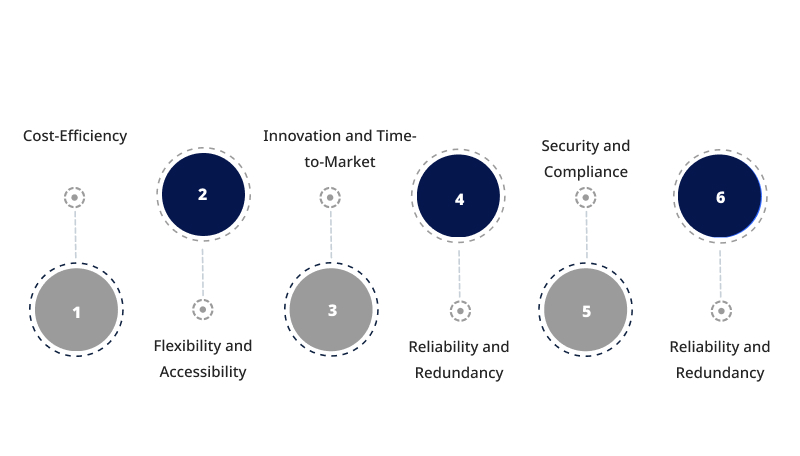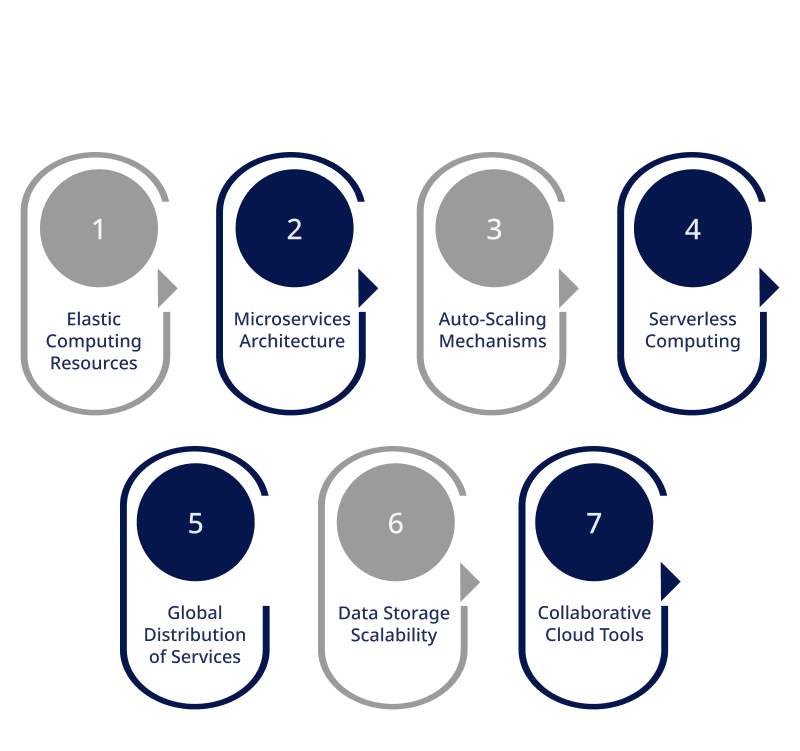Are you struggling to keep up with the demands of your growing business?
The need for scalability in business is more important than ever, yet many traditional systems need help to keep up. It can lose opportunities and profits.
To help you with that, cloud technology solutions can easily scale up as needed without the limitations of outdated systems.
Check out our blog to understand the development of customized, scalable cloud solutions that fit your business needs, allowing you to focus on growth and success.
Understanding Cloud Technology
Cloud technology refers to delivering computing services—such as storage, processing power, and applications—over the internet, commonly known as the cloud.
Organizations can access and use these resources remotely, negating the need for actual hardware or servers. The way that IT infrastructure is traditionally approached has changed due to this technology, which offers scalable and adaptable cloud technology consulting solutions for various businesses.
Types of Cloud Services:
1. Infrastructure as a Service: IaaS provides virtualized computing resources over the internet. Users can rent virtual machines, storage, and networking components pay-as-you-go.
Examples: Amazon Web Services (AWS), Elastic Compute Cloud (EC2) and Microsoft Azure Virtual Machines.
2. Platform as a Service: Users can develop, run, and manage apps with PaaS’s assistance without worrying about the complex specifics of the infrastructure that supports them. It consists of middleware, databases, and development frameworks, among other tools and services used in application development.
Examples: Google App Engine, Heroku and Microsoft Azure App Services.
3. Software as a Service: Software as a Service or SaaS offers subscription-based online software application delivery. Users access applications via a web browser; no installation or upkeep is required.
Examples: Salesforce, Microsoft 365, Dropbox.
Benefits of Leveraging Cloud Technology
Leveraging scalable cloud solutions computing has become a disruptive force changing how companies develop and run their operations. Using the cloud to its full potential has many advantages that help businesses find scalable and practical solutions.
Here’s a closer look at the cloud scalability benefits:
Cost-Efficiency: One of the main advantages of cloud technology is the cost-effectiveness of using cloud technology. Conventional IT infrastructure frequently necessitates large initial expenditures for upkeep, software, and hardware.
On the other hand, pay-as-you-go cloud-based services let companies scale resources according to actual consumption. It ensures that businesses only pay for the processing power, storage, and services they use, eliminating the need for significant capital investments.
Flexibility and Accessibility: Cloud technology benefits provide unmatched accessibility and flexibility, enabling organizations to adjust to changing needs quickly.
Through the cloud, users may access data and apps from any location with internet accessibility. This adaptability helps teams to work together smoothly across geographical boundaries, which is very useful in remote work situations.
Additionally, cloud-based services offer scalable resources, making it simple for businesses to scale up or down in response to demand.
Innovation and Time-to-Market: Utilizing cloud technology for business growth can have a competitive advantage, which speeds up innovation and shortens the time it takes to launch new goods and services.
Rapid application testing, deployment, and prototyping are made possible by cloud platforms’ array of tools and services.
Businesses can add new features, roll out updates more quickly, and quickly adjust to changing market conditions when they can increase resources on demand. This adaptability encourages an innovative culture, which helps businesses stay ahead in fast-paced, cutthroat markets.
Reliability and Redundancy: Through distributed and redundant infrastructure, cloud technology improves the resilience and redundancy of company operations.
By operating data centers across several locations, cloud service companies lower the chance of service interruptions brought on by nearby occurrences.
Services smoothly transition to alternate data centers in the event of hardware malfunctions or outages in one area, guaranteeing ongoing availability. This degree of redundancy reduces downtime, improves the dependability of crucial business applications, and offers a strong base for disaster recovery plans.
Security and Compliance: Businesses can achieve compliance and strong security measures by utilizing cloud technologies. Cloud service providers invest significantly in monitoring tools, encryption, and cutting-edge security processes to protect data.
Furthermore, these suppliers follow stringent industry guidelines and compliance standards, guaranteeing that companies can fulfill all applicable legal and regulatory obligations.
Cloud platforms frequently house specialized security teams, giving companies access to the knowledge and experience of experts always striving to counteract new and emerging risks.
Automatic Updates and Maintenance: The seamless integration of automatic updates and maintenance is one of the cloud’s many notable advantages.
Cloud-based service providers are responsible for updating the infrastructure, services, and apps with the newest features, security fixes, and enhancements. It reduces operational complexity by removing the need for organizations to commit time and resources to manual updates.
With automatic upgrades, organizations may always take advantage of the newest developments without interruptions or downtime. It improves cloud-based systems’ overall performance and dependability while freeing enterprises to concentrate on their core competencies instead of handling repetitive maintenance chores.
Ways to Leverage Cloud for Scalable Business Solutions
Leveraging cloud technology for scalable business solutions involves adopting strategies and practices that harness the flexibility and scalability inherent in cloud platforms. Here are some ways to achieve cloud scalability best practices:
1. Elastic Computing Resources
Cloud technology enables startups to leverage elastic computing resources, providing the flexibility to scale up or down based on demand. Organizations can use elastic computing to dynamically allocate and assign resources like memory, storage, and processing power in response to shifting demands.
Cloud technology consulting scalability guarantees high performance at peak times and cheaper costs during off-peak hours. Businesses can effectively control their infrastructure expenses and adjust to changing operational demands by only paying for the resources they use.
2. Microservices Architecture
A microservices architecture is an additional efficient cloud computing method to create scalable cloud solutions. Using microservices, large, complex applications are divided into smaller, independent, and modular parts.
More agility and scalability are possible because these parts, called microservices, may be developed, deployed, and scaled individually. Because cloud platforms offer the architecture, tools, and services required to manage and orchestrate microservices successfully, they offer the perfect setting for putting microservices into practice.
Businesses may increase overall system resilience, accelerate development cycles, and improve scalability by using microservices architecture on the cloud. This strategy fits very nicely with the changing needs of contemporary companies.
3. Auto-Scaling Mechanisms
Auto-Scaling Mechanisms is the latest technology in cloud computing. Cloud technology enables businesses to implement auto-scaling mechanisms, a key feature for achieving scalability. With auto-scaling, the infrastructure automatically modifies resources following demand.
To maintain peak performance, the system might dynamically allocate more resources during increasing demand or user activity.
On the other hand, the system slows down during times of low demand to save money on needless resource allocation. Because of this flexibility, firms may continue to operate efficiently, adapt well to changes in demand, and make sure that resources are deployed exactly when they’re needed.
4. Serverless Computing
Businesses can create and execute apps using the serverless cloud computing architecture without worrying about maintaining the underlying infrastructure.
With a serverless design, resource scalability and allocation are automatically managed by cloud providers, freeing developers to concentrate only on developing code.
This strategy lowers operating expenses and overhead by doing away with the requirement for companies to provision or maintain servers. Because serverless computing is event-driven, it runs programs reacting to particular triggers or events.
5. Global Distribution of Services
Cloud technology for business growth enables them to distribute their services globally with ease. Businesses can deploy websites, apps, and services across several locations using cloud infrastructure.
It guarantees that end consumers, wherever they may be, have reduced latency and quicker reaction times. For enterprises looking to reach a wider audience or those with an international clientele, the worldwide distribution of services is especially advantageous.
Cloud technology solution companies enable to expand their operations and provide a smooth user experience globally by providing a network of strategically positioned data centers.
6. Data Storage Scalability
When it comes to scalability, cloud technology offers unmatched benefits for data storage. Companies don’t need to make large infrastructure investments to scale up or down in response to changing storage needs.
With cloud storage solutions, businesses may pay for only the storage they use and can choose how flexible their capacity is. This scalability is essential for companies that deal with varying data quantities since it guarantees that they can effectively handle data expansion without worrying about running out of storage space.
7. Collaborative Cloud Tools
Finding scalable cloud solutions requires a vital tactic, which is the use of collaborative cloud tools. Regardless of a team’s location, cloud-based collaboration tools facilitate easy communication and information sharing.
To promote a collaborative work atmosphere, these solutions frequently come equipped with capabilities like real-time document editing, project management, and communication channels.
Teams may read, modify, and share documents in real-time with data saved on the cloud, which boosts productivity and allows for flexible work schedules. These cloud-based collaborative tools are crucial to scalable and effective business solutions since they can be scaled up to meet the company’s changing needs as it expands.
Final Words
Cloud computing has changed the way businesses run, giving enterprises increased flexibility, cost-effectiveness, scalability, and security. Businesses can seize new chances for expansion, innovation, and competitive advantage by utilizing cloud technology consulting.
To achieve growth and success, organizations must comprehend the cloud technology benefits, navigate the cloud landscape, select scalable cloud solutions, and guarantee a seamless migration process.
Take use of the cloud’s power and set off on a revolutionary path to create a company environment that is more flexible, scalable, and prepared for the future.



